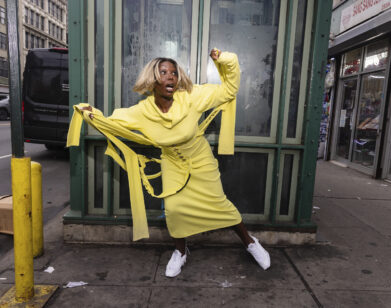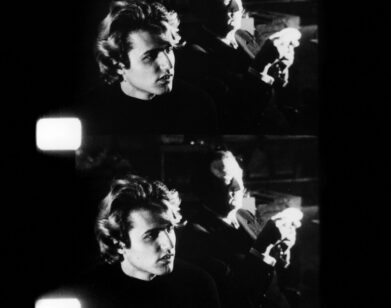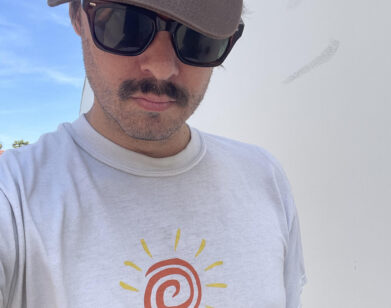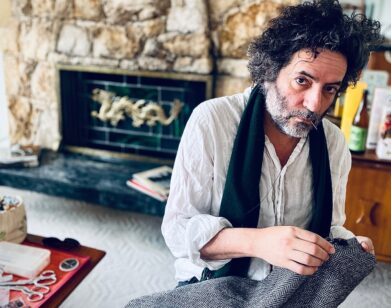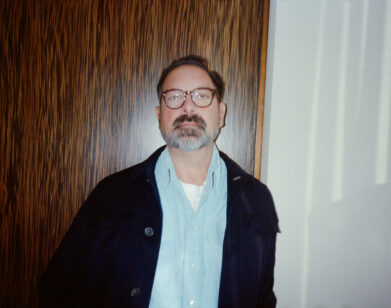Katie Crutchfield and Lucinda Williams on Staying Power and Major Label Bullshit

As Waxahatchee, Katie Crutchfield has been chipping away at her craft for the better part of a decade, uncovering new forms as she goes along. There was the lo-fi rock of American Weekend, her 2012 debut under the Waxahatchee moniker (named after a creek in Crutchfield’s home state of Alabama). There was the blossoming songwriter who appeared on 2013’s follow-up, Cerulean Salt. And in 2017, on Out in the Storm, there was the fully-formed frontwoman who staked her claim as one of the most essential singer and songwriters of her generation. Then, Crutchfield got sober, and in the ensuing clarity made Saint Cloud, her latest album which sees Crutchfield digging into her Southern roots and embracing a genre that can only be described as Americana. It made sense then, that Crutchfield was eager to speak with Lucinda Williams, the icon and undisputed queen of the genre whose latest album, Good Souls Better Angels, was released last week. A couple of months ago, Crutchfield connected with Williams down in Nashville, and well, we’ll let her take it from here.
———
As a musician, a woman from Alabama, a lover of poetry and literature, a believer in the dark, effervescent magic of the deep South, Lucinda Williams’s songs mean everything to me. She tells the stories of my life, the lives of characters I swear I’ve met before, the lives of my mother and grandmothers and aunts and sisters, of black sheep, of the dead and the dying—and she does it with such consistent singularity that I can confidently say I think she’s sitting at the table with the greatest songwriters of all time. She’s certainly my favorite.
In doing this interview, I not only got to sit across from one of my heroes, but was shepherded into her stories with a caring warmth and the natural intimacy she’s so well-known for creating in song. Being an artist presents a variety of pathways to an assortment of different definitions of success. I’ve lived my whole life placing the most value on creative integrity, and through talking to Lucinda, I realized I’m not sure I could have kept my grip on that without her as an unyielding example.
After this conversation, Lucinda and her husband Tom treated me to a dinner of catfish and butterbeans. We talked about Guy Clark and our shared love of Sharon Van Etten, and she continued to drop little seedlings of profound wisdom that I’ll always cherish. I hope you enjoy our conversation. —KATIE CRUTCHFIELD
———
KATIE CRUTCHFIELD: How I feel about your songs is that you’re able to make a point with so few words. Has that always been the case?
LUCINDA WILLIAMS: It came over a period of time. When I discovered Bob Dylan in 1965, it made me want to write. The first album I heard of his was Highway 61 Revisited. I didn’t know what the hell he was talking about. I was twelve-and-a-half years old, but something in me went, “I want to do this.”
CRUTCHFIELD: Are you pickier about lyrics now than when you were first starting out?
WILLIAMS: It depends. Before I met [my husband] Tom [Overby] and found my soulmate, I was able to get away with writing all these unrequited love songs, which was easy. After we got together, I knew it was a turning point. I wanted to start writing about different things and getting outside myself. It was actually very liberating. And now everything’s taken on a whole new turn, with Tom getting involved and us working together.
CRUTCHFIELD: Has it always been easy for you to let somebody in, or do you have to warm up to that?
WILLIAMS: When I first moved to Nashville, the whole co-writing thing—don’t get me started on that. People would be like, “So-and-so wants to write with you.” It was just so people could have their names on things. But I wasn’t totally closed to it. I made an effort to do it. But I wanted to write with people like John Prine and Steve Forbert, which proved to be completely useless because we’re all the same kind of songwriters.
CRUTCHFIELD: I’ve had a lot of creative meet-ups where you’re supposed to work on something and then it ends up being listening to records and not getting anything done.
WILLIAMS: Yeah, that whole Music Row co-writing thing, I never understood it.
CRUTCHFIELD: A lot of bigger pop writing sessions now have 10 or 20 people in the room.
WILLIAMS: I can’t get over that. Then you’ll be reading the reviews of somebody’s album and it’ll be like, “Her songs.” Then I look at who wrote the song and there would be four people’s names on it. It’s not like the old days where Waylon Jennings wrote his own songs, or Loretta Lynn. To me, there’s this lack of identity thing going on.
CRUTCHFIELD: It doesn’t seem like people crave that anymore, which is kind of a shame. I feel like audiences are okay with identity-less music.
WILLIAMS: I don’t think they know. They think that whoever is singing the song had the most to do with writing it. What gets me is when I hear a song and I go, “God, it took four or five people to write a bad song.”
CRUTCHFIELD: I feel like any time I read about your music, especially in the ‘80s and ‘90s, it’s about how it was hard to market because it fell in a lot of different categories. It feels like there’s a lot less focus on genre, and maybe that’s because of streaming. Do you have an easier time with that now?
WILLIAMS: Well, now I do.
CRUTCHFIELD: Yeah, you’re Lucinda Williams.
WILLIAMS: I’ve made it, so to speak. Now I pretty much do what I want. But part of what you’re talking about is the whole Americana umbrella—it can all swim around under that. But in the mid-to-late ‘80s, there was no Americana market, so it was all about how to sell it. Is it country? Is it rock? Americana falls in the cracks between the two, so that’s why I had such a hard time back then.
CRUTCHFIELD: I do want to talk about Car Wheels on a Gravel Road, because there’s so much mythology around making that album. How do you feel about it now? Were you misrepresented?
WILLIAMS: Yeah. The whole thing about the “difficult artist” and saying, “Why did it take so long in between albums?”—people don’t realize there was a lot of the music-business stuff going on behind the scenes that held things up. It wasn’t like I was in the studio for that entire time.
CRUTCHFIELD: I think about collaborators again, because you worked with Gurf Morlix and then you worked with Steve Earle. Those relationships are very hard to navigate.
WILLIAMS: Absolutely. When John Fogerty put out a new album for the first time in 11 or 12 years, there was nothing mentioned about taking so long. I don’t want to get into the woman thing, but there is some of that. People ask me all the time about sexism in the music industry. Of course it exists. It’s not like I play a show and a guy plays a show and he gets paid more than I do, but sometimes it’s a social thing. There weren’t that many other women doing what I was doing. I was hanging out with pretty much all guys, and there’s a boys’ club mentality. There was a guy who promised me a gig when I lived in Austin in the ‘70s. I walked by the club one day and saw the calendar was posted on the outside and it was all filled up for that month. So I confronted him. I said, “You said you were going to book me.” He said, “Well, I figured I already had enough chick singers for the month.”
CRUTCHFIELD: Do you feel like that’s getting better?
WILLIAMS: That’s a hard question to answer because from my perspective, it’s so different now that I’m successful, versus when I was just starting out. I think about this a lot because now there’s this whole thing in country music. “Oh, the stations aren’t playing women enough,” and, “We need to have more women in this and more women in that.” We need to have really good artists. I don’t like this idea that somebody needs to be hired or involved because that person’s a woman. I don’t know if I’m alone in this, or maybe I’m too radical, but it’s kind of reverse sexism.
CRUTCHFIELD: It sounds like you want to take gender out of it completely.
WILLIAMS: I do. I used to hate when they’d say, “All-girl band, or girl drummer.” Why not just say drummer? This whole thing now where it’s, “We need a woman for president.” We need the right person for president, okay? Would it be great if it were a woman? Yes, it’d be awesome! But not because it’s a woman. Because it’s the best person for the job.
CRUTCHFIELD: Getting back to Car Wheels, my understanding is that it was a breakthrough for you.
WILLIAMS: Well, the Rough Trade record [Williams’s self-titled 1988 album] was the first breakthrough because that’s when the critics discovered me. They were all like, “Where have you been all this time?” And I’m like, “Well, I’ve been out there for about 15 years” That’s the first time I went to Europe and played shows there. Rough Trade was the best little indie label. They really put their all into it.
CRUTCHFIELD: Do you think it’s better now that there are so many small labels?
WILLIAMS: Absolutely.
CRUTCHFIELD: I do too, especially when I hear about people’s horror stories on major labels in the ‘90s and early 2000s.
WILLIAMS: The challenge with it is the danger of being sucked up into that thing, the conglomerate that is the major label. It really comes down to who’s running things. With RCA, the only reason I ever thought about signing with a major label was because Bob Buziak was there, and he thought like an indie person and was signing bands like Treat Her Right, real indie-type artists. I never would have gone there otherwise. But it can change at the drop of a hat, and then you’re stuck with somebody who isn’t going to like the fact that you don’t sell a million albums. That’s where the pressure comes in. They’re looking at numbers. In a perfect world, you’ve got the right person who understands you, and you’re not going to have the pressure of having to sell a certain amount of albums. I started saying years ago that indie labels were the way of the future.
CRUTCHFIELD: With streaming and the internet, you can be really big on an indie label. I agree with you. Major labels kind of scare me. When you were recording Car Wheels, did you feel confident that you were making something really great?
WILLIAMS: I like to think that at the end of every album, the next one’s better than the one before. I can remember when we were getting ready to go on the road, they were going to send me out in the van again. And my manager, Frank Callari, came to the rescue, because we’d already been generating a lot of positive feedback. He goes, “We’re not doing the van tour again. We’ve got to get a tour bus.” So I finally got a tour bus for the first time.
CRUTCHFIELD: Who’s your favorite songwriter of all time?
WILLIAMS: Bob Dylan.
CRUTCHFIELD: That’s what I thought you’d say.
WILLIAMS: I’m not going to deny it. I fell madly in love with him in 1965.
CRUTCHFIELD: And you’ve gotten to play with him and meet him?
WILLIAMS: I opened up for him when he toured with Van Morrison, who’s another one of my favorites. It was like, “I can’t fucking believe I’m going to open up for two of my heroes.” And then I saw the guys in the bands were walking on eggshells because Van is kind of crazy and Bob can be crazy, too. I had this fantasy in my mind that I was going to be sitting around with Bob and Van playing songs. I saw Bob once, the first night before I went on. He came up and said hi and welcomed me to the tour. He was real sweet and kind, and then I never saw him again.
CRUTCHFIELD: Wow.
WILLIAMS: Some of the band guys were worried because Van would snap and fire somebody, and Bob would do the same thing sometimes. I’m like, wow, I don’t want this. I don’t want the major label, I don’t want the arena shows, because these guys aren’t having fun.
CRUTCHFIELD: I’ve been feeling that way, too.
WILLIAMS: Maybe that’s part of the answer in terms of staying power—you’re not running yourself ragged trying to be the biggest thing in the world.
CRUTCHFIELD: I think a lot about sustainability, and keeping a career moving, and how that’s hard to do. What do you think has kept you in the business making records people love for so long?
WILLIAMS: I don’t know. It’s like my dad [the poet Miller Williams] with his poetry, and my dad’s peers who wrote and nothing stopped them. They didn’t ever think about quitting because it was just part of who they were, and it’s part of who I am. Not to sound overly idealistic, but I’m an artist first and foremost. I remember when Tom and I got together and got engaged, it was right around the time that [Williams’s 2008 album] Little Honey came out. I was doing interviews on the phone and they started out asking me things like, “Are you still going to be able to write songs now that you’re with Tom?” And I was like, “What? That’s ludicrous.”
CRUTCHFIELD: It’s crazy. That’s something they’d never ask a man.
WILLIAMS: I was just floored.
CRUTCHFIELD: What’d you say?
WILLIAMS: It pissed me off. I was like, “Why should that change?”
CRUTCHFIELD: Now that you’re married.
WILLIAMS: Yeah, because I can’t write love songs and there’s nothing left to write about. So I’m just going to curl up in the kitchen. And I’m like, “You’ve got to be fucking kidding me, is this how stupid people are?” And then I have to try to explain: “Yes, I’ve found my soulmate, yes I’m going to be with him the rest of my life, but guess what? I’m an artist, first and foremost. Regardless of what kind of house I’m living in, how much money I make, who I’m with—that doesn’t affect my art.”
CRUTCHFIELD: I think people can feel that the quality of what you’re making has never gone down. It’s just always been good. I was really feeling that this morning when I was listening to your new album. It was so exciting to me as a young artist, listening to somebody who’s still making music that’s just as good, if not better, than the stuff that broke you through.
WILLIAMS: Maybe it’s the world of poets and novelists I grew up in. I saw them getting older and getting better. I remember my dad once said, “In the poetry world, you gain respect the older you get and the better your work gets.” The jazz world is that way, the blues world is that way. It’s that way pretty much everywhere, except for what we do. You’re supposed to stay 25 forever, and at a certain point you make two or three great albums and then you fizzle out. I can’t imagine that happening to me.


